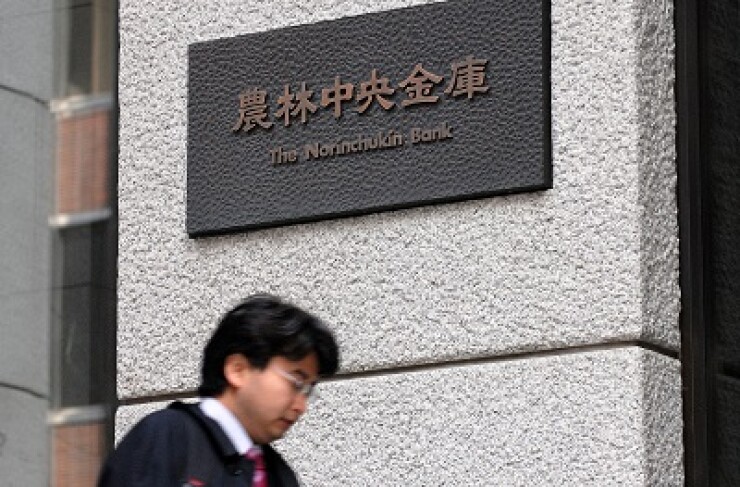The U.S collateralized loan obligation market largely bid farewell to its biggest buyer earlier this year. Now Japan’s Norinchukin Bank is back.
The lender to Japan’s farmers and fisherman has restarted purchasing collateralized loan obligations after dramatically cutting back around April amid heightened market scrutiny, according to people familiar with the matter. In Norinchukin’s absence, managers of leveraged loans bundled into bonds found other willing buyers, said the people, asking not to be identified discussing a private matter.
Nochu, as it’s known, was until very recently a massive presence in the $600 billion CLO market, buying as much as half of the highest-rated bonds in the fourth quarter in Europe and the U.S., according to estimates compiled by Bloomberg. That helped sustain record growth which in turn sparked regulatory scrutiny and diverted attention to the bank’s outsize role in the market, prompting its recent retrenchment. But even in its absence, CLO sales held near record pace, underscoring their popularity with investors starved of yield.

“We aim to build a portfolio of bonds, equities and credit with healthy risk balances by exercising necessary checks,” a representative for the bank wrote in an e-mailed statement. “CLOs are credit assets that we will invest in based on this concept.”
Nochu is back purchasing from a select group of CLO managers on its list of pre-approved sellers — a coveted checklist of the industry’s biggest managers, said the people. Still, even with a largely absent Nochu, sales hit $35.9 billion in the second quarter, compared with $29.5 billion in the first three months of the year.
CLO managers that had normally placed deals with Nochu instead syndicated the top-rated portions more broadly, the people said. Even more noteworthy was the impact on spreads, or the premium above the Libor benchmark that the bonds pay.
Average spreads on the triple-A rated bonds sold by top-tier managers tightened to roughly 130 basis points across May and June, compared with about 138 basis points in the first quarter, according to data compiled by Bloomberg. Market participants point to the tightening as proof of the CLO market’s resilience.
Negative Yields
Nochu’s historically voracious appetite is a function of negative yields offered by Japanese government bonds, which propelled the nation’s banks overseas in search of better returns. Nochu’s holdings of top-rated CLO bonds dwarf those of the market’s other biggest buyers.
It held more than 18% of all triple A-rated CLO bonds outstanding at the end of March 31, according to research by Citigroup Inc. Wells Fargo & Co. held around 9.5% while Japan Post Bank Co. owned approximately 2.9%, the Citi research showed.
“The basic concept of Norinchukin Bank’s investment is global diversification,” the bank’s representative said in its email, written in response to questions from Bloomberg News.
Heightened Scrutiny
Nochu’s recent retrenchment came amid attention on the scale of its purchases, as regulators globally expressed concerns about potential excesses in the market and sought to determine who the owners were. Nochu was among banks questioned by Japan’s Financial Services Agency about how they manage risks, officials at the regulator said in late February. In March, The Bank of Japan joined its efforts in stepping up the scrutiny.
That the market continued ticking by without its biggest buyer underscores the need among investors for juicier premiums, after yields elsewhere in credit markets fell amid signals the Federal Reserve will cut interest rates. CLOs are also seen by many as a safe asset to hold through any financial crisis, after they were largely unscathed in the last one.
For their part, managers typically like having Nochu anchor a deal because it drives tighter pricing and offers certainty a deal will swiftly get done. In exchange, Nochu asks managers for more stringent restrictions on their behavior and stiffer protections in the deals’ documentation. And despite its pullback in the last three months, Nochu is still considered by many to be the most consistent buyer in the market, and one that will be there during good times and bad.





